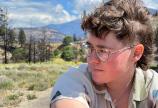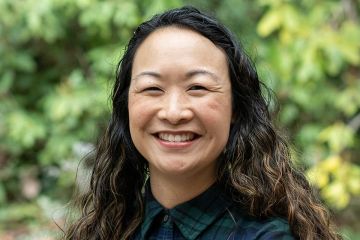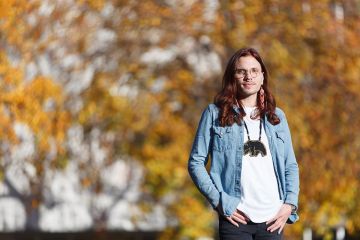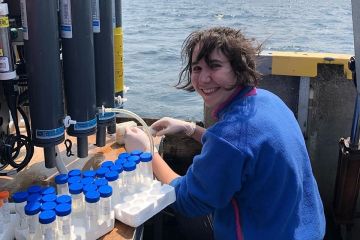A climate of change
- John Threlfall
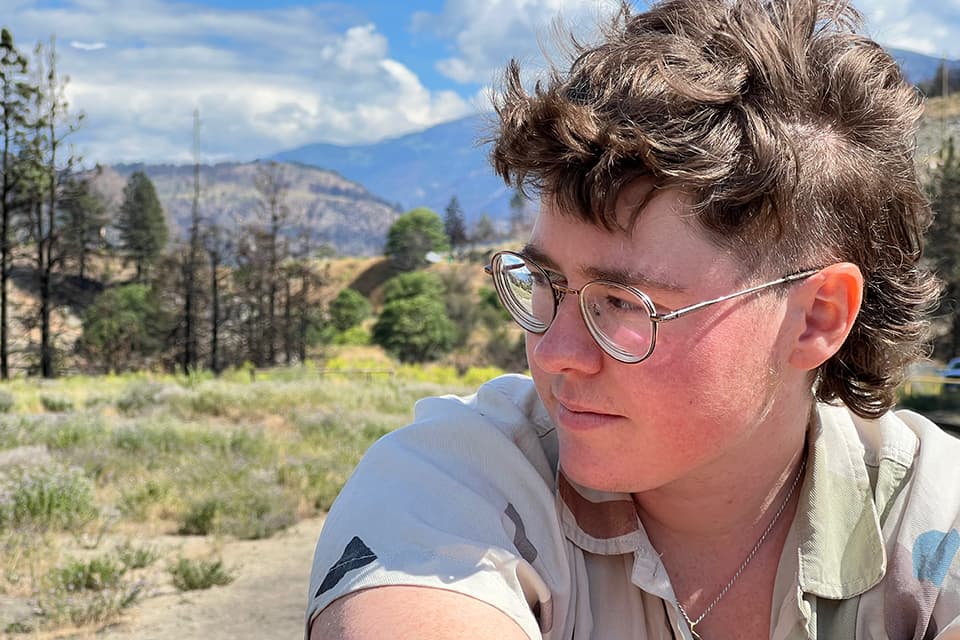
Given the deluge of headlines about fires, floods, droughts and heat domes, it’s easy to feel a sense of despair around our continuing climate crises. The challenge, therefore, is to find hope amidst the chaos. Yet that’s exactly what graduating Department of Writing student Aldyn Chwelos has done while working with UVic’s Climate Disaster Project.
"I've heard from people who have lost their home, their community and their entire town, and they're still somewhat hopeful," says Chwelos. "Sometimes it's a skeptical or a heartbroken hope, but it's still there. As someone who hasn’t experienced that much personal damage from climate change, how could I possibly not be hopeful and ready to fight when they still are?"
Sharing survivor stories
Using the model of an international teaching newsroom to train students in trauma-informed journalism techniques, the Climate Disaster Project (CDP) has already made a significant impact in the past two years by sharing eyewitness accounts of climate survivors and building an international community based on hope, trust and empowerment.
Funded by an initial $1.875 million donor investment and led by veteran journalist Sean Holman—now Writing’s Wayne Crookes Professor of Environmental and Climate Journalism—the CDP works with partner institutions across Canada and around the world to collect, compile and share survivor stories with local and national media outlets like The Tyee, the Aboriginal Peoples Television Network (APTN), CBC Radio’s What On Earth, the Fraser Valley Current and the International Network of Street Papers.
"We listen to everyone's story, without question of who they are or where they come from or what they're going to say," says Chwelos. "When a flood or a fire comes through your town, it arbitrarily destroys everything. By focusing on these disasters and highlighting the different ways people are affected, you can show that universality, which is key to seeing ourselves reflected in their experience and wanting to help."
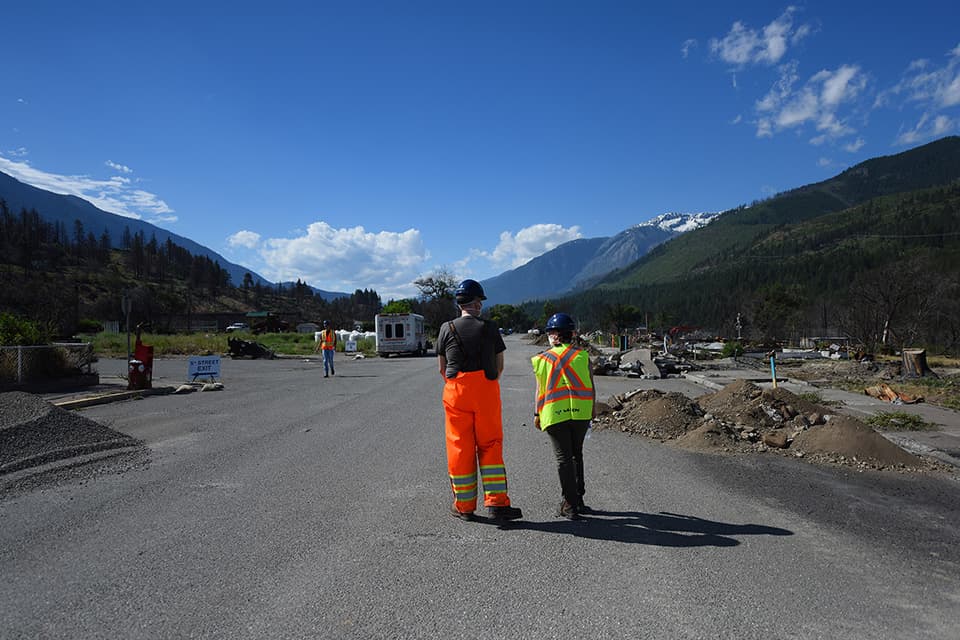
A journey of discovery
It’s no exaggeration to say that Chwelos’ work with the CDP has changed the way they see the world — especially since writing and journalism isn’t where they started their UVic journey.
Originally enrolled in computer science and then "dabbling" with courses in environmental and gender studies, Chwelos switched to working in the local tech industry but soon realized they wanted to be doing something of more closely aligned with their values. "I'm an incredibly pragmatic human and felt like computer science made more economic sense, but I soon became disillusioned and knew that wasn't what I wanted to do," they say. "But I'd always wanted to be a writer, so I came back and enrolled in Writing."
After discovering creative nonfiction as a genre and profile writing as a passion during their introductory Writing 100 course, Chwelos was ideally positioned to enroll in Holman’s class when the Climate Disaster Project launched in September 2021.
"From day one, it was all about realizing that climate change has a huge stamp on everything," they recall. "The whole point of the project and Sean’s class was to not minimize those experiences — we students may not have lost our homes to wildfires or flooding, but we’re all part of the situation that caused those disasters and so we can see ourselves in the project."
Media that really matters
Currently the CDP’s managing editor, Chwelos is planning on doing their graduate degree in creative nonfiction at UVic in 2024, and very much sees their time with the CDP as the culmination of their time here—including a harrowing journey to Lytton a year after the small BC town was destroyed by fire. ("It was like driving through the belly of the beast," they recall. "You really felt for the community and what they’d lost, to see the entire town basically reduced to rubble.")
While Chwelos has published non-climate disaster articles with the likes of Canadian Geographic and Hakai, they feel their work with the CDP gives them the opportunity to use everything they’ve learned. "It combines my interests in social justice and environmentalism and also aligns with my background in software development," they say. "As far as the sheer amount of experience and personal challenge it represented, work with the CDP has definitely been the highlight of my degree."
The power of positive change
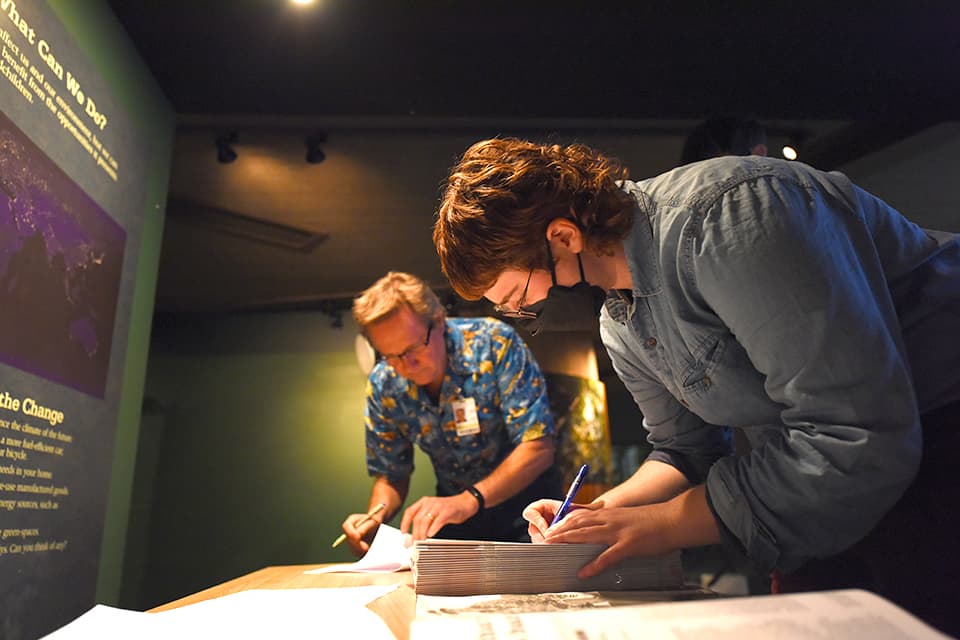
Ultimately, Chwelos has discovered the power of positive change through their work collecting survivor stories, sharing them with the media and engaging with new students in the Climate Disaster Project.
"There’s a lot of criticism around media coverage of the climate crisis, but our work has been held up as an example of how disaster survivors want to see these disasters covered. That's where this work has power: it’s not just in the stories we're sharing with the world, but in the experience we're creating for the people who go through it," says Chwelos.
"It’s been a powerful experience for the storytellers…the communities we write about feel seen and their stories are being shared as they want them to be told. If more people in different communities do this and share their experiences, if they start talking about climate change and solutions and potentially taking political action and making policy changes, then there is hope.”
Photos
In this story
Keywords: convocation, climate
People: Aldyn Chwelos

